You can keep your organic perfumes fresh naturally through several proven methods. Essential oils like tea tree and lavender provide antimicrobial protection, while natural antioxidants from rosemary and geranium prevent oxidation. Storing your perfumes in dark glass containers at consistent temperatures (60-70°F) helps maintain their integrity. Using proper carrier oils and maintaining a 70% alcohol concentration creates stability. Understanding these preservation techniques will help you master the art of natural perfumery.
The Role of Essential Oils in Natural Preservation
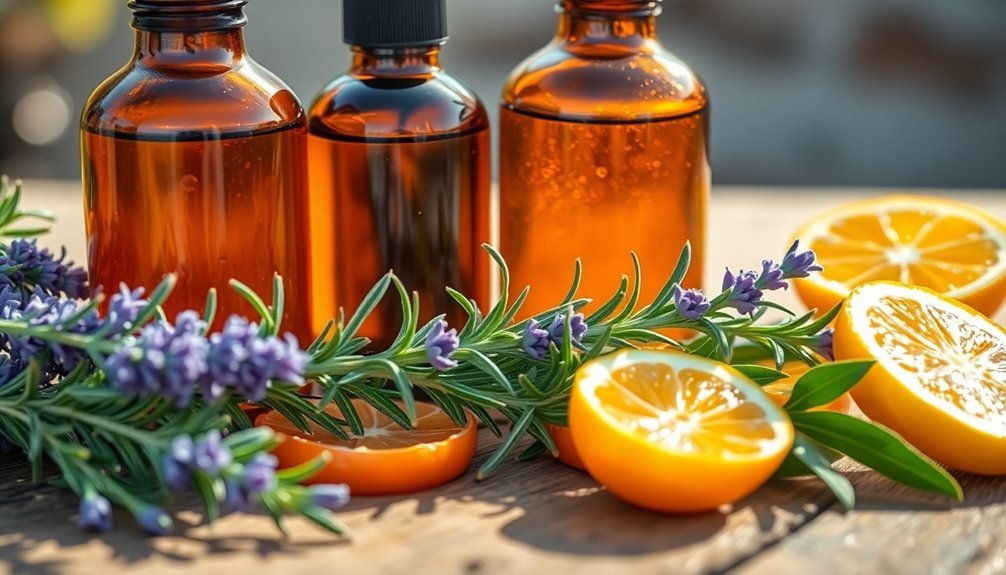
While synthetic preservatives dominate the fragrance industry, essential oils serve as nature's powerful alternative for maintaining the freshness and stability of organic perfumes.
You'll find that these natural extracts contain built-in antimicrobial properties that protect your perfume from bacteria and fungi, particularly in oils like tea tree and lavender.
Essential oils work as preservatives through multiple mechanisms. Their antioxidant properties, found in rosemary and geranium, prevent oxidation and spoilage. Carefully measuring 10% dilution ratios ensures these natural preservatives maintain their effectiveness without becoming overpowering.
When you combine different essential oils, they create synergistic effects that enhance fragrance stability and longevity. Natural fixatives like cedarwood and patchouli help anchor the scent, while others stabilize the perfume's pH level.
Together, these properties create a balanced, long-lasting fragrance that stays fresh without relying on synthetic chemicals.
Understanding Alcohol-Based Stabilization Methods
Although many seek chemical-free perfumes, organic alcohol plays an essential role in natural fragrance stabilization.
You'll find that ethanol, a natural alcohol, acts as both a preservative and stabilizer in organic perfumes. When used at a 70% concentration, it effectively prevents microbial growth while maintaining the integrity of your fragrance compounds.
Unlike synthetic preservatives, organic alcohol works naturally with your perfume's essential oils, helping to blend and distribute them evenly throughout the formula. The solvent properties of alcohol ensure optimal mixing and dispersion of fragrant ingredients.
As you wear the fragrance, the alcohol's controlled evaporation process allows for a gradual release of scent molecules, creating that desirable progression from top to heart notes.
While alcohol-based organic perfumes may not last as long as their chemical counterparts, they offer better projection and a more authentic aromatic experience.
Carrier Oil Selection for Extended Shelf Life
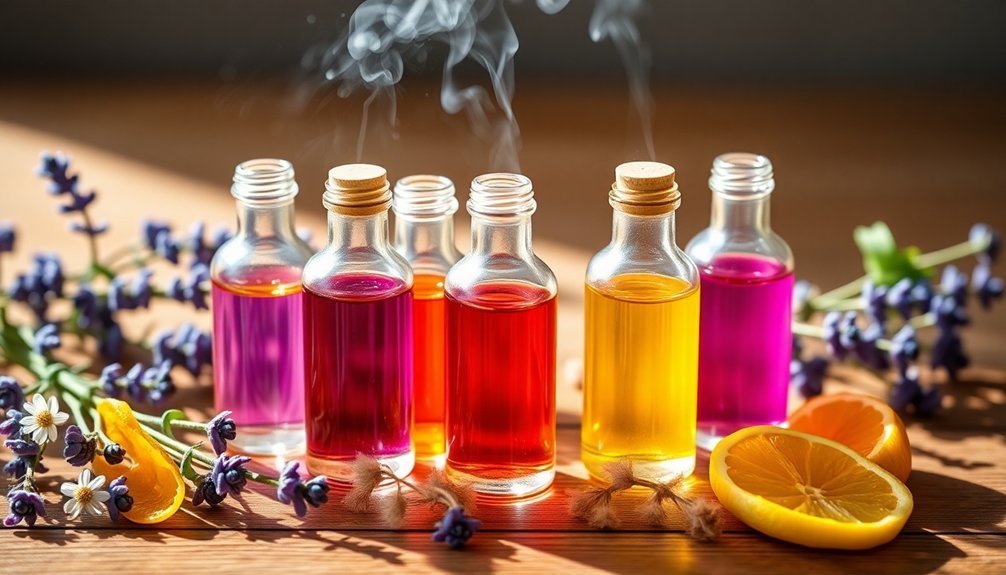
When selecting carrier oils for organic perfumes, understanding their fatty acid composition becomes essential for maximizing shelf life. You'll want to choose oils with higher saturated fatty acid content, as they can last up to 1-2 years, while those high in unsaturated fatty acids typically last only 6 months.
To extend your perfume's longevity, combine short-shelf-life oils with ones containing natural antioxidants like Vitamin E or Lauric Acid. Adding 1% Vitamin E Oil can help prevent rancidity in your organic perfume blends.
Store your blends in dark amber or cobalt glass bottles, keeping them in cool, dark places away from direct sunlight and heat sources. While refrigeration works well for most oils, some like Avocado and Fractionated Coconut Oil don't require it.
For maximum preservation, consider freezing your carrier oils – this can double their shelf life, though some may temporarily solidify.
Natural Antioxidants as Preservative Agents
Essential oils offer more than just fragrant properties in organic perfumes – they serve as powerful natural preservatives through their antioxidant compounds.
You'll find rich antioxidants like limonene, linalool, and eugenol in oils such as cinnamon, neroli, and lavender, which actively fight free radicals and prevent oxidative stress.
When you're formulating organic perfumes, these natural antioxidants work alongside other preservatives to maintain product stability and extend shelf life.
They'll protect your fragrance components from degradation while supporting skin health through their protective properties.
However, you'll need to be mindful of potential sensitivities, as some antioxidant compounds can trigger allergic reactions.
That's why it's vital to carefully balance these ingredients and guarantee proper labeling for safety and transparency.
The Science Behind Vitamin E as a Stabilizer

Building on the power of natural antioxidants, Vitamin E (tocopherol) stands out as a master stabilizer in organic perfume formulations.
You'll find it working tirelessly behind the scenes, protecting your favorite scents from oxidation and maintaining their integrity over time.
When you're choosing an organic perfume, look for products that harness Vitamin E's protective powers in these key ways:
- It prevents fragrance oils from turning rancid by neutralizing harmful oxygen and ozone effects.
- It safeguards aldehydes (common perfume ingredients) from oxidative damage at concentrations as low as 0.001%.
- It outperforms conventional stabilizers like BHT while being gentler on your skin.
This natural preservative works best in oil-based formulations, where it seamlessly integrates with essential oils and other natural fragrance components to guarantee your perfume stays fresh longer.
Cold Storage and Temperature Control Techniques
You'll want to store your organic perfumes in temperature-controlled environments between 60-70°F (15-21°C) to maintain their natural potency and prevent degradation of essential oils.
Keep your fragrances in dark places like interior closets or drawers, away from windows and heat sources that can destabilize the organic compounds.
A dedicated storage cabinet or refrigerator with humidity control offers the best protection for your natural scents, provided you use airtight containers to prevent moisture absorption.
Temperature-Controlled Storage Solutions
Maintaining the right temperature is essential for preserving organic perfumes, with ideal storage conditions ranging from 50°F to 70°F (10°C to 21°C).
You'll find that temperatures around 55-60°F work best to slow down the evaporation of volatile compounds and protect your fragrance's integrity.
To keep your organic perfumes fresh, consider these temperature-controlled storage options:
- Use a dedicated cosmetic refrigerator to maintain consistent temperatures while keeping your perfumes separate from food items.
- Install a temperature-controlled cabinet with precise settings to prevent fluctuations.
- Set up a thermometer in your storage area to monitor conditions and guarantee they stay within the ideal range.
Remember to store your bottles upright and tightly sealed, away from heat sources like radiators, electronic devices, or sunny windowsills.
Dark Places Preserve Quality
Three key factors affect the longevity of organic perfumes, with proper dark storage being crucial for preserving their quality and potency.
You'll want to store your fragrances in dark places, away from both natural and artificial light, as exposure accelerates aging and can alter their color. Keep your perfumes in their original packaging, which provides ideal protection against light and air degradation.
Don't store your organic perfumes in the bathroom, where high humidity can break down the fragrance. Instead, choose a dry closet or drawer with consistent humidity levels.
When handling your perfumes, make sure you're sealing the caps tightly to prevent oxidation and evaporation. Rather than shaking the bottles, which introduces unwanted air, gently roll them between your hands to mix the contents.
Dark Glass Containers and UV Protection
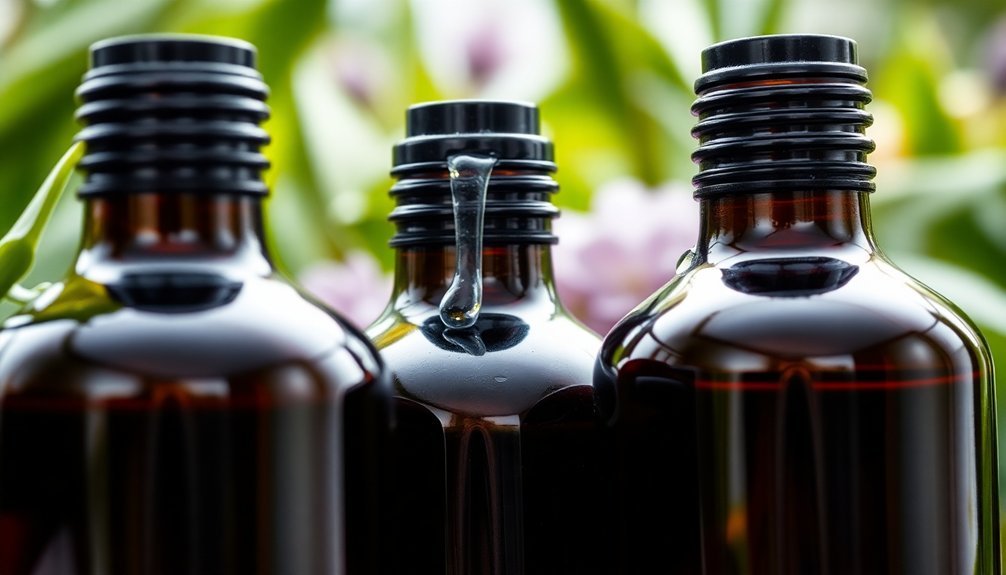
When protecting organic perfumes from degradation, dark glass containers serve as essential guardians against harmful UV rays. Your best options include Miron glass, with its superior UV protection and violet hue, opaque black glass for complete light blocking, and amber glass for effective UV absorption.
Here's what each type does to preserve your perfume:
- Miron glass filters out harmful rays while allowing beneficial light through, making it ideal for high-end organic formulations.
- Opaque black glass provides total UV protection, preventing oxidation and maintaining scent integrity.
- Amber glass absorbs hazardous wavelengths while acting as a barrier against environmental factors.
You'll want to avoid clear glass containers, as they offer no UV protection and can lead to scent degradation, color changes, and that unwanted musty smell in your organic perfumes.
Botanical Extracts With Antimicrobial Properties
Natural perfumes rely heavily on botanical extracts that do double duty – they not only create enchanting scents but also act as powerful preservatives through their antimicrobial properties.
You'll find ingredients like black seed and fir balsam absolute working effectively against harmful bacteria at concentrations as low as 12.5-25 μg/mL.
Common perfumery ingredients such as juniper berry extract, angelica root oil, and copaiba balsam protect your fragrance by disrupting bacterial cell walls and interfering with their cellular structures.
These botanicals contain active compounds like γ-cadinene and β-caryophyllene that naturally preserve your perfume.
What's even better is that when these extracts are combined, they often work synergistically, enhancing their preservation power while creating complex, natural scent profiles that stay fresh without synthetic preservatives.
The Power of Rosemary and Grapefruit Seed Extract
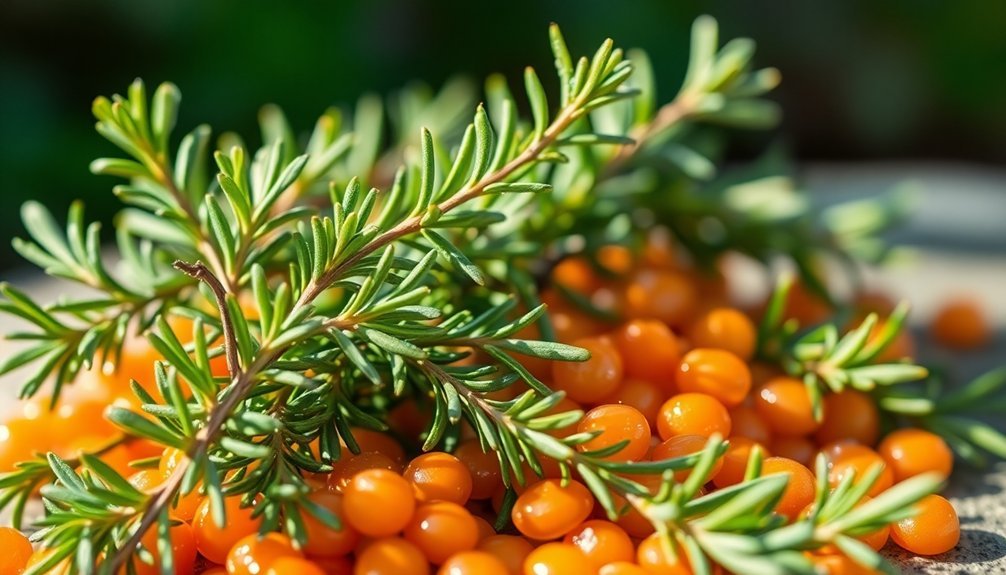
Among the most effective botanical preservatives in organic perfumery, rosemary and grapefruit seed extract (GSE) stand out for their dual benefits.
When you're creating natural fragrances, these ingredients don't just add antimicrobial properties – they enhance the overall formulation.
While rosemary brings a fresh, herbal scent that blends beautifully with citrus notes, GSE works behind the scenes as a powerful preservative.
You'll find these ingredients particularly effective when used together, offering:
- Natural preservation with GSE's recommended use levels of 0.1% to 1.0%
- Antioxidant benefits that extend your perfume's shelf life
- Antimicrobial protection that helps control bacterial growth
Remember to store your organic perfumes in a cool, dry place, and always perform a patch test before extended use, especially if you're pregnant or have health concerns.
Proper Blending Ratios for Longevity
To create a long-lasting organic perfume, you'll want to start with a 20% base note concentration using fixatives like sandalwood or patchouli.
You can mix your essential oils at a 30% concentration with carrier oils for ideal staying power, while ensuring you're using oils with high odor intensity.
For natural preservation, incorporate 0.5% rosemary extract or grapefruit seed extract into your final blend to maintain the perfume's integrity without synthetic preservatives.
Essential Oil Base Ratios
When creating organic perfumes, understanding essential oil base ratios is crucial for achieving lasting fragrances that evolve beautifully on your skin.
The classic ratio follows a proven formula for a well-balanced scent: 30% top notes, 50% middle notes, and 20% base notes.
For a standard blend, you'll want to combine your oils in this sequence:
- Start with 4 drops of base notes like sandalwood or vanilla
- Add 10 drops of middle notes such as rose or lavender
- Finish with 6 drops of top notes like citrus oils
Mix these with your carrier oil at a 20% concentration (20 drops essential oils to 80 drops carrier oil).
If you have sensitive skin, reduce the concentration to 15%.
Always record your measurements to recreate successful blends later.
Natural Preservative Proportions
Natural preservatives play an essential role in extending your organic perfume's shelf life while maintaining its chemical-free integrity. You'll need to carefully measure specific concentrations of each preservative to guarantee peak effectiveness. Understanding proper ratios helps you create a stable, long-lasting formula.
| Preservative Type | Recommended Concentration |
|---|---|
| Willow Bark Extract | 2.5-5% |
| Leucidal SF Max | 2-4% |
| Phytocide Aspen Bark | 0.2-3% |
| Verstatil® TBG MB | 1-1.5% |
When blending these natural preservatives, you'll want to maintain a pH between 4.0-6.0 for maximum effectiveness. If you're using oil-based formulations, consider Phytocide Elderberry OS as your primary preservative. Remember to test your preservative system regularly to confirm it's providing adequate protection against microbial growth.
Carrier Oil Mixing Rules
Successful carrier oil blending relies on precise ratios and thoughtful combinations that maximize your perfume's longevity.
You'll want to maintain a 20% essential oil concentration in your carrier oil mixture, which translates to 20 drops of essential oils per 80 drops of carrier oil in a 5ml bottle.
For ideal results, follow these essential mixing guidelines:
- Blend your essential oils first (using the 30/50/20 rule for top, middle, and base notes) before adding carrier oils.
- Match carrier oils to your skin type – use lighter oils like grapeseed for oily skin and richer oils like jojoba for dry skin.
- Keep your tools clean and use dark glass containers to prevent contamination and maintain freshness.
If you have sensitive skin, reduce the essential oil concentration to 15% and always perform a patch test.
Air-Tight Packaging Solutions
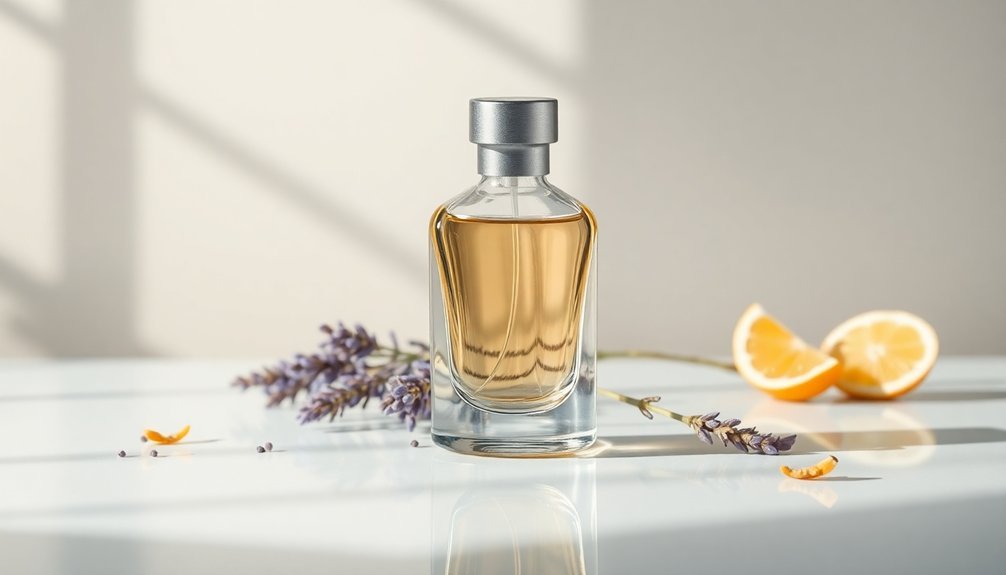
Proper air-tight packaging plays an essential role in preserving organic perfumes' delicate aromas.
You'll want to keep your perfume in its original container, as it's specifically designed to protect against light and moisture damage. Don't transfer your fragrance to decorative bottles, which might compromise the airtight seal and accelerate oxidation.
Store your perfume bottle in its original box for added protection against accidental drops, and consider placing it in an airtight bag for an extra barrier against environmental factors.
When traveling, opt for travel-sized bottles with secure caps to prevent leakage and minimize air exposure. Always keep the bottle tightly closed when you're not using it, and avoid bottles with balloon pumps as they're prone to leaking and won't maintain an airtight seal.
Natural Preservation Through Aging Process
While aging can greatly impact organic perfumes, understanding the process helps you preserve their unique characteristics.
The natural aging of perfumes involves complex changes in their note structure, where top notes gradually blend with heart notes, creating deeper, more integrated scents. You'll notice these changes more prominently in organic perfumes due to their natural ingredients.
To work with the natural aging process, follow these preservation tips:
- Store your perfume in a cool, dry place between 4-22°C to prevent essential oil precipitation and excessive evaporation.
- Keep bottles sealed tightly to minimize oxygen exposure, which can alter the fragrance's composition.
- Protect your perfumes from light exposure by using dark storage containers or keeping them in their original packaging.
These practices help maintain your organic perfume's integrity while allowing it to age gracefully.
Monitoring and Maintaining Fragrance Stability

To maintain your organic perfume's stability, you'll need precise temperature control methods like storing bottles in a cool, dark place and avoiding exposure to direct sunlight or heat sources.
You can enhance preservation by incorporating natural stabilizers such as vitamin E oil, rosemary extract, or grapefruit seed extract into your formulation.
Your choice of container matters greatly, so opt for dark amber or cobalt blue glass bottles with tight-fitting caps to protect against UV damage and minimize oxidation.
Temperature Control Methods
Maintaining stable temperatures plays an essential role in preserving organic perfumes' integrity and longevity.
You'll want to store your fragrances in cool, consistent environments below 70°F (21°C), ideally in basements or interior closets away from windows and heat sources.
For best preservation, consider these proven temperature control methods:
- Use a temperature-controlled cabinet set to 55-60°F (13-15°C) to protect your perfumes from environmental damage.
- Monitor storage conditions with a thermometer and hygrometer, adjusting as needed to prevent molecular breakdown.
- Consider a wine refrigerator for stable cooling, but avoid regular refrigerators that can cause condensation issues.
Remember to minimize moving your perfumes between different environments, as frequent temperature changes can alter their chemical composition and compromise their natural qualities.
Natural Preservative Ingredients
Natural preservatives serve as essential guardians of organic perfume stability, offering both protective and aromatic benefits without synthetic chemicals.
You'll find options like phenethyl alcohol, which provides a delicate rose-hyacinth scent while fighting microbes, and glyceryl caprylate, which moisturizes as it preserves.
Though these natural preservatives work across various pH levels and allow for organic certification, they do have limitations.
You'll need higher concentrations compared to synthetic alternatives, and their effectiveness can vary between batches.
When choosing organic perfumes, look for trusted certifications like COSMOS, ECOCERT, or NATRUE to guarantee quality standards.
These certifications confirm that your fragrance contains properly sourced natural preservatives and remains free from harmful synthetic chemicals while maintaining its stability and freshness.
Storage Container Selection
When selecting storage containers for organic perfumes, proper vessel choice plays a vital role in preserving their delicate aromatic compounds. Your best option is to keep the fragrance in its original bottle, as manufacturers design these containers specifically to maintain airtight conditions and block harmful light exposure.
If you need to transfer your organic perfume, follow these essential guidelines:
- Choose a high-quality glass bottle with a secure seal and reliable atomizer.
- Verify the container is completely clean and free from any residual scents.
- Select dark-tinted or opaque bottles to protect against light degradation.
Avoid using plastic containers, as they're more permeable to oxygen and can compromise your perfume's natural ingredients.
Quality containers will help maintain your organic fragrance's integrity and extend its shelf life without relying on synthetic preservatives.
Frequently Asked Questions
How Do Seasonal Temperature Changes Affect the Potency of Organic Perfumes?
You'll notice your organic perfume's potency varies with seasons. It'll evaporate faster and smell stronger in summer heat, while cold weather makes it last longer but project less from your skin.
Can Organic Perfumes Trigger Allergic Reactions Despite Being All-Natural?
Yes, you can definitely have allergic reactions to organic perfumes. Natural oils can trigger allergies through autoxidation and skin enzyme reactions. Don't assume "all-natural" means hypoallergenic – these products can still cause skin irritation.
What's the Average Time Before an Opened Organic Perfume Starts Losing Fragrance?
You'll typically notice your organic perfume's fragrance start to fade within 1-2 years after opening. Even with proper storage in cool, dark places, natural ingredients will gradually lose potency due to oxidation.
Do Organic Perfumes Interact Differently With Various Skin Ph Levels?
Yes, your skin's pH level directly affects organic perfumes. You'll notice they're more sensitive to pH variations than synthetic fragrances, adapting uniquely to your skin's chemistry and potentially changing their scent profile accordingly.
Can Organic Perfumes Be Layered With Synthetic Fragrances Without Chemical Reactions?
You'll want to be cautious when layering organic and synthetic fragrances. They can interact unpredictably, causing skin reactions or altered scents. It's best to test combinations on a small area first.
In Summary
You've discovered that keeping organic perfumes fresh doesn't require synthetic preservatives. By combining essential oils, natural alcohol, carefully chosen carrier oils, and antioxidants like vitamin E, you're able to create stable, long-lasting fragrances. When you store your perfumes in dark, air-tight containers and understand proper blending ratios, you'll maximize their shelf life naturally. Remember, proper monitoring and maintenance will guarantee your organic perfumes remain vibrant and pure.
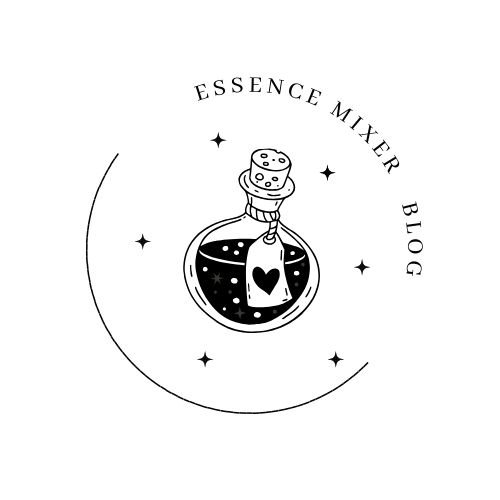
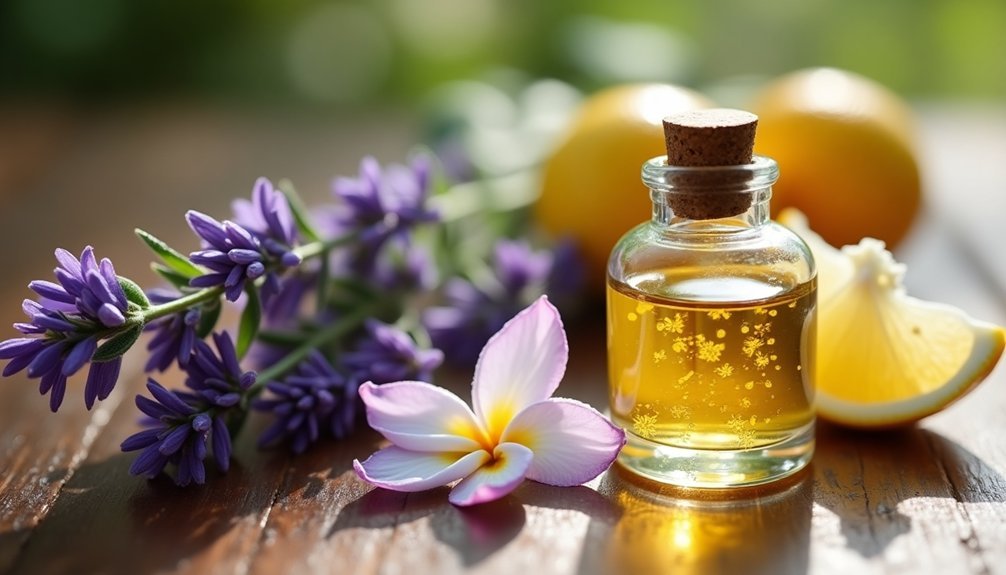
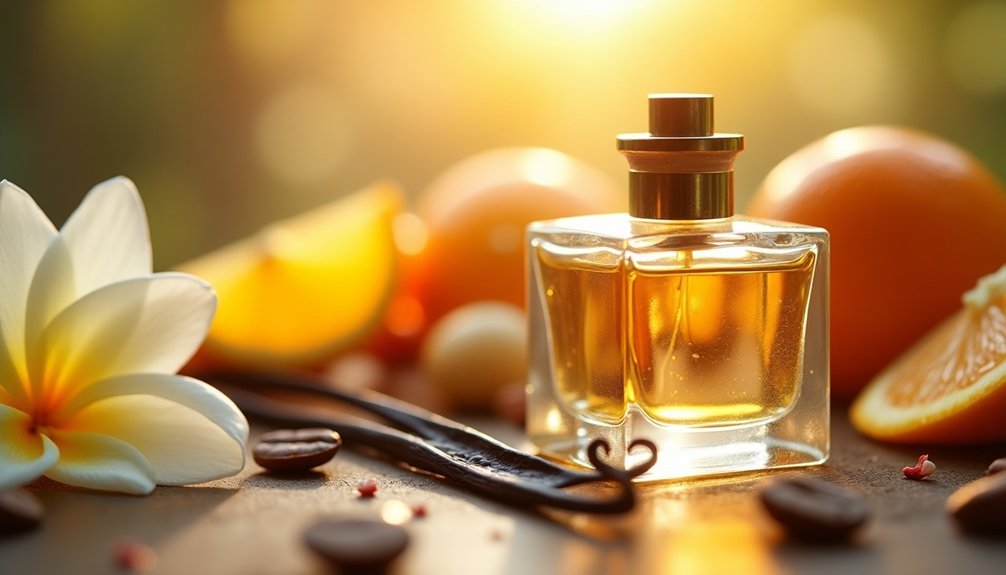
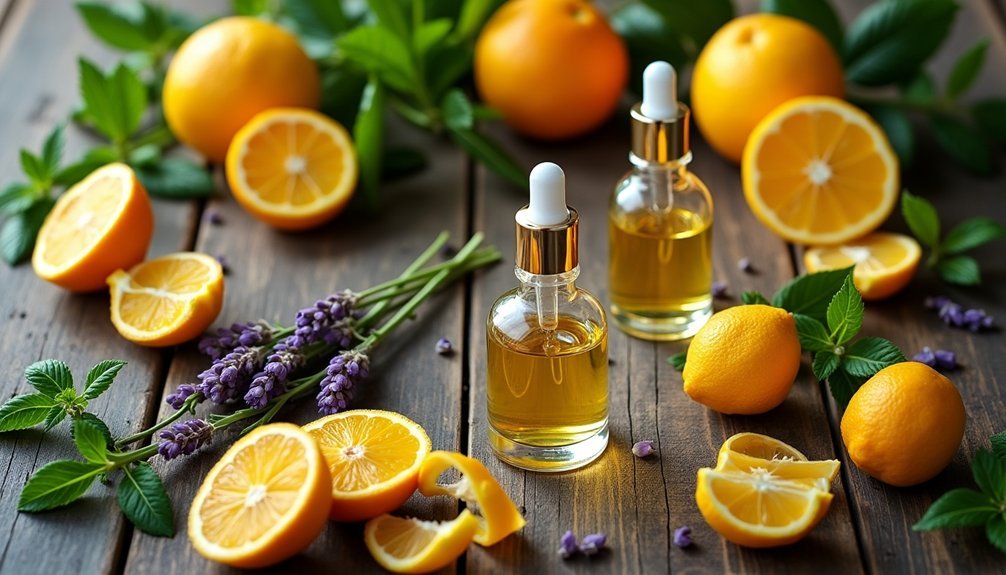
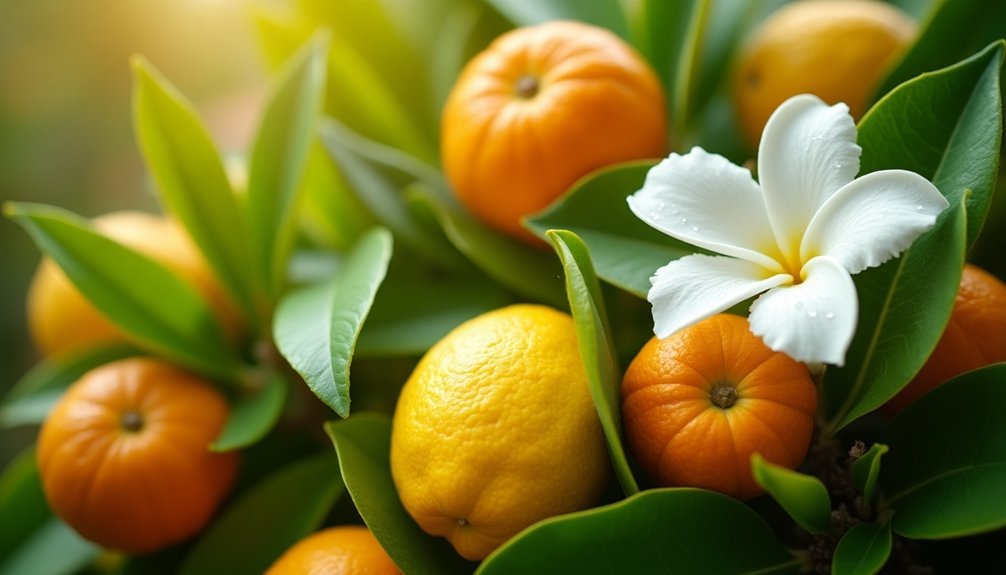
Leave a Reply